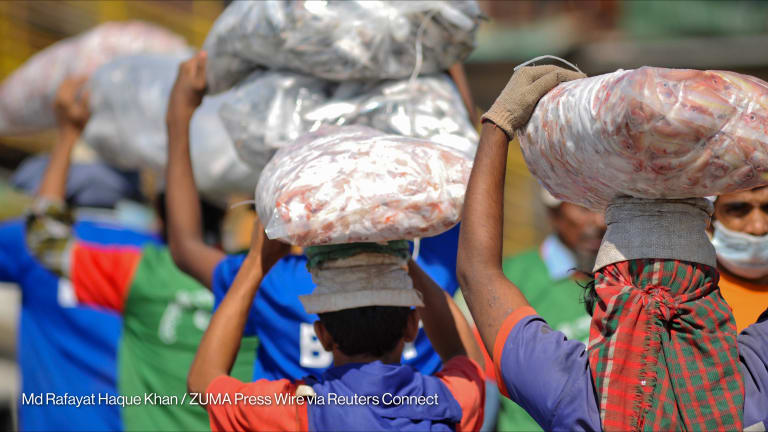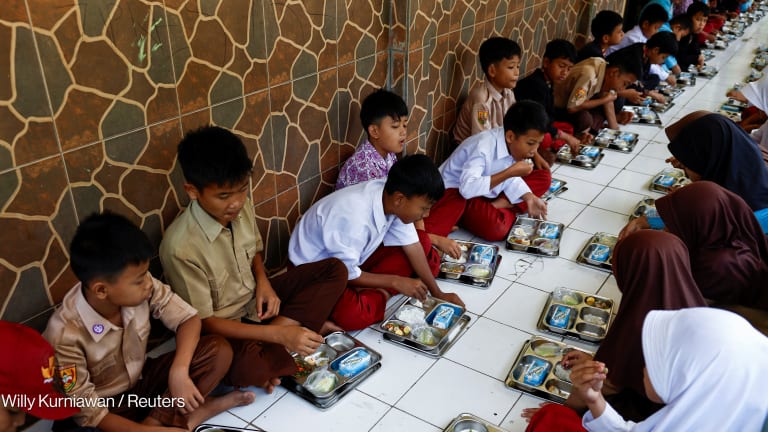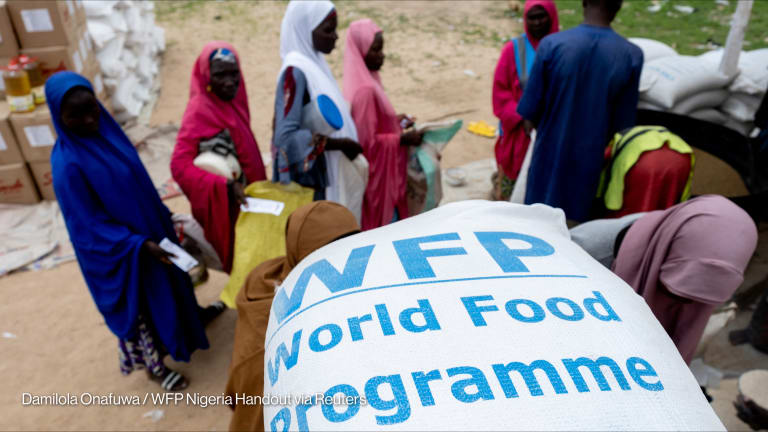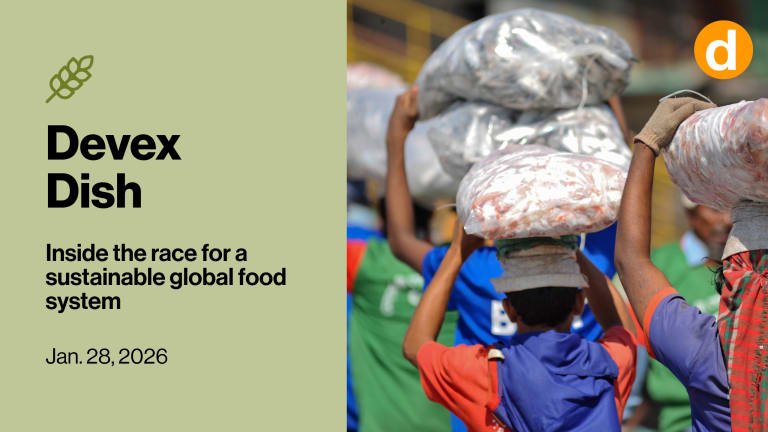Q&A: IDB says Latin America can lead on sustainable agri-supply chains
IDB Invest CEO James Scriven says that as the world's largest exporter of food the world, Latin America can influence how the world sustainably feeds a growing population.
When James Scriven, CEO at IDB Invest, joined the organization five years ago, very little of its business was in the agricultural sector. Today, over 10% is. “We felt that we needed to develop an area of expertise to be very present in this sector to be able to improve productivity and very importantly, make the sector more sustainable,” Scriven tells Devex. “We've been able to penetrate a sector that was in the past, not very … relevant for us.” IDB Invest is the Inter-American Development Bank’s private sector arm, and sustainability is a focus of the IDB Group’s Vision 2025, championed by IDB President Mauricio Claver-Carone. The strategy includes a greater focus on small- and medium-sized enterprises and prioritizing climate change response. Latin America is the world’s largest food-exporting region, and Scriven said innovation in sustainable agricultural supply chains has the potential to influence the way the rest of the world produces and transports its food. He discusses with Devex how IDB Invest is focusing its investments on reducing agriculture’s impact on the environment while scaling production to reduce food insecurity, and how businesses are realizing sustainability is no longer something they can ignore. This conversation has been edited for length and clarity. What is the importance of sustainability in agricultural supply chains for IDB Invest? Five years ago there was a decision taken to restructure the private sector arm of the IDB Group, and part of that decision was that we needed to be more impactful in the region. And when we looked at the industries that really have an impact in our region, we realized that our work, expertise, and knowledge in agribusiness was very small. If you can see every cycle of crisis that we've had, food security was highlighted as one of the most important issues to address in [an] ever-growing population of the world. What we felt is that Latin America, not only for itself but for the rest of the world, had to continue to be the breadbasket of the world. The region is the biggest exporter [of food] in the world and has been central in what is the supply chain of food around the world. What needs to happen to make agriculture more sustainable at scale and in the region, and how can IDB Invest help achieve that? We are pleased to see how resilient this sector is to [the pandemic]. If you look at some countries in particular, if you look at Colombia and Brazil that are large producers of commodities, they still grew between 2 and 3% last year and this year. The bad news is that this sector does consume three-fourths of the region’s freshwater and produces almost half of greenhouse gas emissions. So, the flip side of agribusiness is the consumption of rare and scarce resources that this planet has. So, our focus is not only the production of these assets in a productive way — and at a lower price and make them more efficient — but to use less of our planet. The vast majority of producers in the region are smallholders. What challenges does that pose in affecting this change at scale with those types of producers versus the bigger agribusinesses? Let me give you [an example] that would illustrate the challenge, but also the opportunity: We’re an institution that in impact is large but in [a] number of people and presence is relatively small compared to how large our audience is. So, what we've been able to do is go for what we call anchor companies, large companies that amalgamate or concentrate these large farmers as their value chains. “Agribusiness is the largest in Latin America, the largest employer or has the largest network to influence inclusive business models.” --— James Scriven, CEO, IDB Invest Conaprole in Uruguay — the largest producer of dairy products in Uruguay — has access to thousands of small farmers in their value chain. So, when we work with Conaprole it is not necessarily to give credit to Conaprole but to use it to get to all those thousands [of] farmers. We don't take credit exposure for these large companies. We use it to get to the small company because we know that they will end up selling the milk to Conaprole. Given the market share of food exports that Latin America holds, what global influence can Latin America have if it prioritizes sustainable supply chains? Latin America and the Caribbean is known to be innovative around agribusiness when you think about [drip] irrigation, when you think about efficiency in harvesting, when you think about connectivity. The biggest competitive advantage that Latin America has is its connection to the world and people looking, copying, and using examples of what we do to take to the rest of the world. We share these experiences with other regional development banks. When you're having these conversations with CEOs of big companies and banks in the region, how difficult is it for you to convince people that sustainable agricultural supply chains must be at the top of the list? Easier than before. If I go back maybe five, six years, it was one of the most difficult conversations that we had with owners, companies. They were aware of the effects of climate [change], they were aware of the effect that they had over land use and water use, but it wasn't [at the] top of their mind. At the top of their mind was price, price, selling. --“Two words come to mind: sustainability and inclusiveness. Our area of expertise is centered around how to make more sustainable the production when it needs less land use, less water use, less production of greenhouse emissions.” There’ve been a number of things that have happened over the last few years that has changed their minds. I’d love to say it was us, but you go through a hurricane and you realize right away that you don’t have the luxury to go through a second one. So, the constant reminders of how fierceful [the] climate has become with us is a good reminder of how to build back better in the context of any form of [an] act of God. We’ve seen with the changes of generations, myself but even more important my daughters and my son. They are constantly reminding [people] that what they want to consume is something that was originated in a sustainable way. I think consumers are affecting companies. It’s not only us as financers — we’ve got a large voice, but ultimately their customers are changing their views. So when you look at Central America, for example, that has the U.S. as the large consumer, the U.S. is changing. You look at Starbucks, you look at all these companies that are looking for sustainable sources and want to have a good traceability of how they receive their products. How can IDB Invest help accelerate change? Two words come to mind: sustainability and inclusiveness. Our area of expertise is centered around how to make more sustainable the production when it needs less land use, less water use, less production of greenhouse emissions. That area is the biggest value add that we have as an organization. People come to us just because of that. Let me add a second part, which is the inclusiveness of the business models. Agribusiness is the largest in Latin America, the largest employer, or has the largest network to influence inclusive business models. When you think about small farmers, when you think about Indigenous populations, when you think about rural farmers, when you think about excluded vulnerable communities, everything relates to agribusiness. When we look at tourism, I want the companies that I'm financing in tourism to be buying locally to small farmers. For example, the avocados that you see when you go to a large resort in the Caribbean have to be produced locally. That’s the inclusive business model that we’re after. Visit the Future of Food Systems series for more coverage on food and nutrition — and importantly, how we can make food fair and healthy for all. You can join the conversation using the hashtag #FoodSystems.
When James Scriven, CEO at IDB Invest, joined the organization five years ago, very little of its business was in the agricultural sector. Today, over 10% is.
“We felt that we needed to develop an area of expertise to be very present in this sector to be able to improve productivity and very importantly, make the sector more sustainable,” Scriven tells Devex. “We've been able to penetrate a sector that was in the past, not very … relevant for us.”
IDB Invest is the Inter-American Development Bank’s private sector arm, and sustainability is a focus of the IDB Group’s Vision 2025, championed by IDB President Mauricio Claver-Carone. The strategy includes a greater focus on small- and medium-sized enterprises and prioritizing climate change response.
This story is forDevex Promembers
Unlock this story now with a 15-day free trial of Devex Pro.
With a Devex Pro subscription you'll get access to deeper analysis and exclusive insights from our reporters and analysts.
Start my free trialRequest a group subscription Printing articles to share with others is a breach of our terms and conditions and copyright policy. Please use the sharing options on the left side of the article. Devex Pro members may share up to 10 articles per month using the Pro share tool ( ).
Teresa Welsh is a Senior Reporter at Devex. She has reported from more than 10 countries and is currently based in Washington, D.C. Her coverage focuses on Latin America; U.S. foreign assistance policy; fragile states; food systems and nutrition; and refugees and migration. Prior to joining Devex, Teresa worked at McClatchy's Washington Bureau and covered foreign affairs for U.S. News and World Report. She was a reporter in Colombia, where she previously lived teaching English. Teresa earned bachelor of arts degrees in journalism and Latin American studies from the University of Wisconsin.








